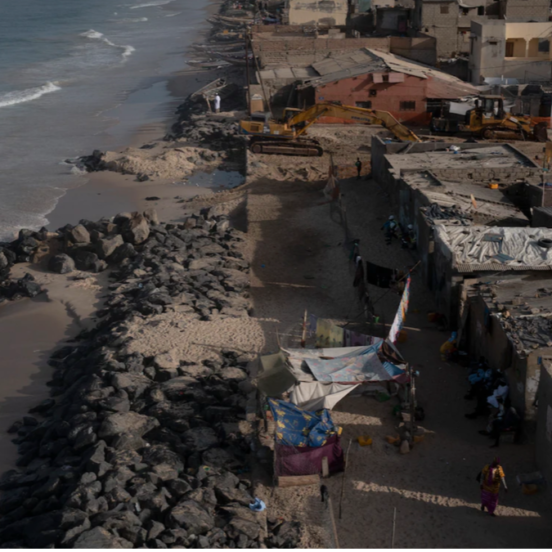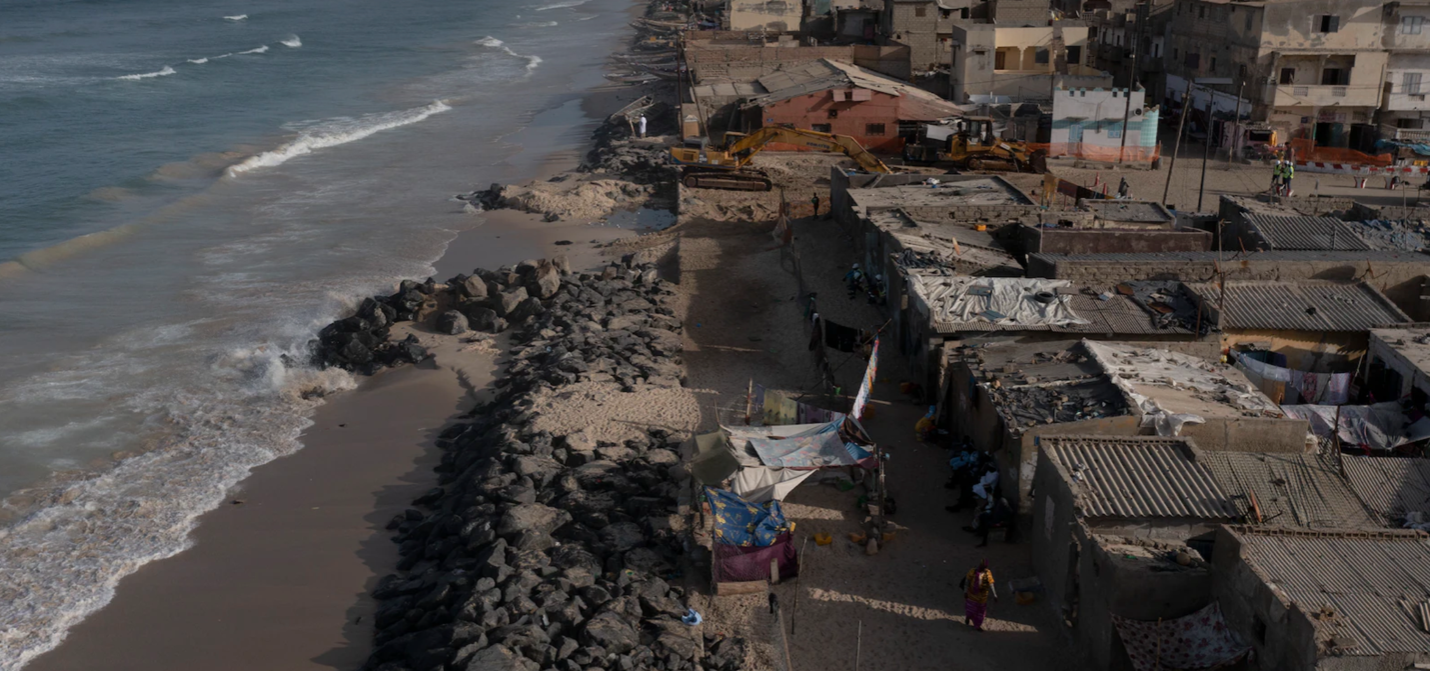Climate, Health and Equity Brief
Vanishing coasts, rising costs and a new CO2 record
June 14, 2022

The Climate, Health & Equity Brief is GMMB’s take on the week’s news on the current impacts of climate change. If you haven’t subscribed yet, you can do so by clicking here.
Hot Topic: Africa in focus. Several new reports out this week highlight the brutal climate inequities between rich and poor nations, starting with the disastrous impacts of sea level rise.
Approximately 200 million people around the globe could be uprooted by 2050 due to shoreline erosion and flooding, according to the UN—and the problem is particularly acute in West Africa, where 80 percent of the population lives along the Atlantic coast. In Senegal, rising sea levels are already eroding the coast at a shocking rate of 10 feet per year, forcing thousands in seaside communities to abandon their vibrant, bustling communities and relocate to barren displacement camps several miles inland.
And disproportionate climate impacts don’t stop with Africa’s vanishing coasts. Intense heat, crippling drought and extreme weather all threaten hundreds of millions of people on the continent, and a new report out this week shows just how far short donor nations are falling in keeping pace with climate-fueled humanitarian need. According to a report from Oxfam, the UN must now provide an average of $15.5 billion in aid each year due to extreme weather events alone—an annual increase of more than 800% since 2002. Despite this, wealthy nations whose vast economic growth has fueled the climate crisis are contributing only half of the humanitarian aid required to meet the need.
Despite mounting evidence of human suffering around the world as the climate crisis intensifies, NOAA shared some grim statistics this week. The amount of planet-warming carbon dioxide in the atmosphere broke a record in May and is now at the highest point in at least 4 million years. And despite lots of rhetoric and some real action from governments to mitigate climate change, humans still pumped 36 billion tons of the planet-warming gas into the atmosphere in 2021, more than in any previous year.
—Matt & Traci, GMMB
Human Health
A new study published in the British Medical Journal warns that a new specialty in climate cardiology is needed to address the growing impact of climate change on cardiovascular health, with scientists attributing an estimated 93,000 cardiac deaths globally to high temperatures in 2019. (Medicalxpress.com)
Extreme rainfall triggered catastrophic landslides and floods across Northeastern Brazil, killing at least 91 people, destroying more than 4,000 homes and displacing thousands of people across the region. (CNN)
Hurricane Agatha became the strongest hurricane in recorded history to make landfall during the month of May, killing 11 people and leaving 20 missing in the southern state of Oaxaca, Mexico. (AP News)
Planetary Health
Scientists at NOAA report that there is now more planet-warming carbon dioxide in Earth’s atmosphere than at any point in the last 4 million years and emissions continue to climb, with humans pumping a record-setting 36.3 billion tons of CO2 into the atmosphere in 2021 alone. (The New York Times)
The saddest aspect of life right now is that science gathers knowledge faster than society gathers wisdom.”
– Isaac Asimov
Equity
Experts warn that only 22% of weather stations in Africa meet global climate observing system reporting requirements and the lack of extreme weather monitoring and warning systems on the continent is putting Africans at risk and creating critical gaps in global climate data. (The Washington Post)
Despite a startling new report which finds that the climate crisis has increased humanitarian aid costs by 800%, wealthy donor nations—who are also the world’s largest greenhouse gas emitters—are only providing half of what is needed to address climate-fueled disasters. (CNN)
Scientists warn that up to 86 million residents in sub-Saharan Africa could be forced from their homes by 2050 due to extreme climate impacts, and Saint-Louis, Senegal—among Africa’s most vulnerable cities—is at risk of being 80 percent underwater in less than 60 years. (The Washington Post)
A new compilation from Axios’ Climate Truths Deep Dive Series highlights the impact of and responses to climate change in the U.S. at the municipal level and how local action is just as necessary as global policy in determining our climate future. (Axios)
Politics & Economy
The Biden Administration unveiled two new initiatives to combat climate change, boost clean energy, promote adaptation and strengthen energy security across Latin America and the Caribbean in an effort to promote cooperation on the climate crisis across the Western hemisphere. (The Washington Post)
President Biden has announced a 24-month moratorium on tariffs for solar panels from Southeast Asia and invoked the Defense Production Act to drive U.S. manufacturing of solar panels and other clean energy technologies. (Reuters)
In an effort to boost climate innovation, the U.S. Patent and Trademark Office has launched a new pilot program that will incentivize innovators to bring more climate solutions to the world and accelerate the approval process for climate technologies. (Protocol)
The House Committee on Science, Space and Technology is pushing for stricter monitoring of industrial emissions after a new report revealed that domestic oil and gas companies are grossly underreporting their methane emissions. (The Washington Post)
Life as We Know It
School closures due to extreme heat are becoming increasingly common across the U.S., with 36,000 schools nationwide in need of new cooling and ventilation systems, a problem that is particularly acute in low-income school districts. (The Washington Post)
Action
American farmers are diversifying their tactics in hopes of long-term sustainability by planting cover grains and crops that can potentially provide soil protection and help retain water in the face of increasing heat and drought. (Axios)
California-based scientists at the US Geological Survey have begun utilizing historical knowledge from Indigenous communities to identify appropriate land-use policies to reduce wildfires and create healthy forests across the state. (Nature)
Kicker
Did you know that floods and storms displaced 28.6 million people from their homes in 2020? Visit the Internal Displacement Monitor Centre’s global database to see where humans are most at risk.
The GMMB Climate, Health & Equity Brief would not be possible without the contributions of the larger GMMB California team— Elke Cortes, Devin Della Maggoria, Sharde Olabanji and Stefana Simonetto. Feedback on the Brief is welcome and encouraged and should be sent to CHandEBrief@gmmb.com.






